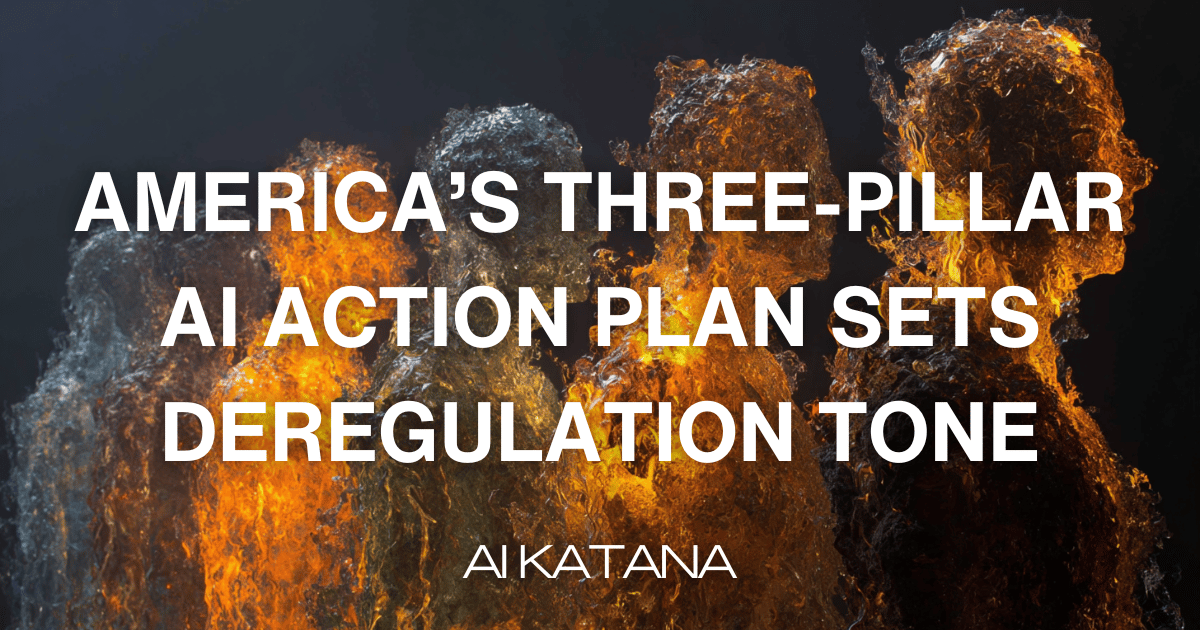- AI KATANA
- Posts
- America’s Three-Pillar AI Action Plan Sets Deregulation Tone
America’s Three-Pillar AI Action Plan Sets Deregulation Tone
Also: Tesla Taps Samsung in $16.5B Deal for Next-Gen AI6 Chips

An AI scheduling assistant that lives up to the hype.
Skej is an AI scheduling assistant that works just like a human. You can CC Skej on any email, and watch it book all your meetings. It also handles scheduling, rescheduling, and event reminders.
Imagine life with a 24/7 assistant who responds so naturally, you’ll forget it’s AI.
Smart Scheduling
Skej handles time zones and can scan booking linksCustomizable
Create assistants with their own names and personalities.Flexible
Connect to multiple calendars and email addresses.Works Everywhere
Write to Skej on email, text, WhatsApp, and Slack.
Whether you’re scheduling a quick team call or coordinating a sales pitch across the globe, Skej gets it done fast and effortlessly. You’ll never want to schedule a meeting yourself, ever again.
The best part? You can try Skej for free right now.
Hello!
Washington is pushing hard on deregulation with a sweeping three-pillar AI Action Plan, while Cheyenne, Wyoming, prepares for a 10-gigawatt data-center that could draw more power than every home in the state. Across the Pacific, Chinese firms are forming twin alliances to knit chips and models together into a self-reliant ecosystem just as Hainan’s pan-Asian Hardware Battle spotlights startups from spatial-audio speakers to neuro-wellness headsets. On the corporate front, Tesla locked in a $16.5 billion silicon deal with Samsung, and Zhipu’s open-source GLM-4.5 shows China’s model race isn’t slowing. Tools took centre stage too: Anthropic is throttling heavy coders on Claude, while Chrome now auto-summarises storefront reputations. Investors stayed busy—Micro1 is circling a half-billion valuation to outflank Scale AI and Salient landed $60 million to robotise loan servicing. Scroll on for the full slice of today’s top AI moves.
Sliced just for you:
🏛️ America’s Three-Pillar AI Action Plan Sets Deregulation Tone
⚡ Cheyenne’s 10-GW AI Data Center Could Outpower All Wyoming Homes
🤝 China’s New Dual Alliances Aim for Self-Reliant AI Ecosystem
🔋 Tesla Taps Samsung in $16.5B Deal for Next-Gen AI6 Chips
🐉 Zhipu Rolls Out Open-Source GLM-4.5 to Fuel Agentic Apps
🏆 Hainan Hardware Battle Crowns Spatial-Audio Startup Cear Inc
The White House’s newly released plan lays out over 90 federal actions aimed at “winning” the global AI race by prioritising innovation over regulation. Pillar I orders agencies to roll back rules deemed obstacles to rapid deployment, promising streamlined licensing and fast-track visas for AI talent. Pillar II outlines a national compute network, tax credits for domestic fabs and public-private “AI Test Ranges” modelled on the early internet’s NSFNET. Pillar III pushes diplomatic initiatives, including a G7-style “Innovation Compact” and export-control harmonisation to counterbalance rival blocs. Critics caution that aggressive deregulation could widen safety gaps, but supporters argue the blueprint positions U.S. firms for a decade of dominance.
Cheyenne city officials confirmed plans for a Crusoe–Tallgrass complex starting at 1.8 GW and scalable to 10 GW, enough to eclipse statewide residential consumption. The project leverages Wyoming’s cool climate and cheap gas, pairing dedicated turbines with future solar-wind offsets to temper emissions. Local leaders tout billions in tax revenue and tech-sector diversification; grid experts warn of upward pressure on retail rates as utilities re-tool transmission. Construction could begin within months pending fast-track regulatory approvals, with phases expected online by 2027.
Timed to the close of Shanghai’s WAIC, two industry alliances link LLM developers (StepFun, MiniMax) with domestic GPU makers (Huawei, Biren, Metax) to synchronise model requirements and silicon road-maps. Dubbed the “Model-Chip Ecosystem Innovation Alliance” and the Shanghai AI Committee, the groups pledge shared reference designs, pooled IP, and bulk-buy leverage to offset U.S. export curbs. Early showcases include Huawei’s CloudMatrix 384 cluster and open-source 3D world-building from Tencent. Analysts say the alliances could accelerate home-grown alternatives to Nvidia’s banned H-series chips within two years. [Read more]
Elon Musk revealed a multiyear wafer-supply agreement that dedicates Samsung’s new Texas “megafab” to manufacturing Tesla’s AI6 SoC. The unified die will span FSD-Supervised driving, Optimus robots and training clusters, streamlining Tesla’s hardware stack and reducing reliance on Nvidia. AI5 tape-out with TSMC remains on track for interim vehicles, but Musk hinted total Samsung spend could “be several times higher” as volumes ramp. The collaboration grants Tesla influence over fab-floor optimisation, mirroring Apple’s relationship with TSMC.
Beijing-based Zhipu, one of China’s “AI Tigers,” open-sourced GLM-4.5 featuring 1.8 T tokens and multi-agent orchestration APIs optimised for coding, retrieval and voice interactions. The release brings China’s tally to 1,509 published LLMs this year, ahead of any other nation, and follows OpenAI’s admission that Zhipu is fast securing regional government contracts. Researchers note the model’s permissive licence but caution about alignment gaps. Zhipu plans a cloud service tier and an enterprise version tuned for Mandarin compliance audits later this quarter.
The inaugural Hainan Southeast Asia AI Hardware Battle wrapped with Japan’s Cear Inc taking top honours for a speaker that uses generative acoustics to create 3D soundscapes steered by on-device AI. Runners-up included Hong Kong’s Robocore service-robot stack and UK-based Cresento’s AI shin-guard that diagnoses football injuries mid-match. All ten finalists earn demo slots at BEYOND Expo 2026 and retail showcases in Japan’s Tsutaya Bookstores, underscoring Hainan’s bid to be “the first stop for smart hardware going global.”
🛠️ AI tools updates
Facing nonstop background workloads from power users, Anthropic will cap Pro, $100-Max and $200-Max subscribers with two new weekly limits that reset every seven days. Less than five percent of users are expected to hit the ceiling, but additional capacity can be purchased à-la-carte. The move follows seven outages in a month and mirrors pricing pivots by competitors like Cursor and Replit.
An upcoming Chrome desktop update will surface AI-crafted pop-ups summarising a merchant’s reputation for price, returns and service, drawing on partner review feeds such as Trustpilot and Bazaarvoice. The feature arrives amid rising competition from AI-powered browsers like Perplexity’s Comet and The Browser Company’s Dia, and dovetails with Google’s broader Gemini-integrated shopping roadmap.
💵 Venture Capital updates
Data-labeling up-start Micro1 is finalising a round led by 01A and LG Technology Ventures after reporting revenue growth from $10 million to $50 million in six months. The firm’s recruiter-matching engine aims to poach specialised annotators from incumbents, and former Twitter COO Adam Bain recently joined its board. [Read more]
Fintech platform Salient attracted funding from Andreessen Horowitz, Matrix and Y Combinator to scale its generative-AI compliance and collections suite. The company claims lenders have cut handle times 60 percent and saved $12 million annually via automated dispute resolution and fraud detection. Funds will expand into title management and credit-dispute workflows.
🫡 Meme of the day

⭐️ Generative AI image of the day

Before you go, check out an AI Audio Trick Lets Starling “Save” a PNG in Its Brain.


